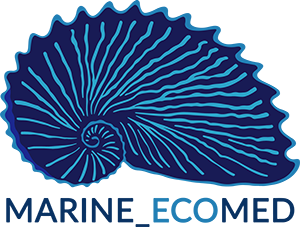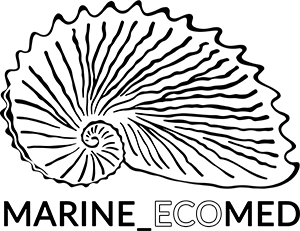The concept of Ecosystem Services (ES) have been shaped by nature conservation scientists in the attempt to emphasize the benefits natural ecosystems provide to society. The recognition of such benefits can support the effective communication about maintaining ecosystem functionality and to highlight the need for their sustainable management to target groups (e.g. decision makers, stakeholders, economic actors), overall supporting effective nature conservation.
The Marine Ecosystem Services Game was designed to enable the understanding of ES concept through a role-playing simulation where interactions typical of the negotiation process that take place around the use of natural resources and their benefits were recreated.
It represents one of the main deliverables of the MARINE_ECOMED project. It was firstly developed and internally tested between November 2018 and May 2019 within the Planning Climate Change Research Lab at University IUAV of Venice. Then, the game was played for the first time by the students participating to the 1st edition of the MARINE_ECOMED Intensive Study Programme workshop in June 2019 in Marseilles.
This was a special occasion for students from different institutions and countries to actively interact and dive into the negotiation processes around marine and coastal resources through the role-playing simulation.
The role playing simulation was adapted from a previous game1 developed by the University IUAV of Venice in the context of the project TERRE “Territory, Energy & Employment” co-funded by the South East Europe Transnational Cooperation Programme. The original version of the game focused its attention on the negotiation on natural resources and multiple ecosystem services in a terrestrial area. In the new version developed for the MARINE_ECOMED Project, the simulation is set in a marine and coastal area. The participants are brought to reflect on the relations between coastal and maritime activities, and the benefits deriving from marine and coastal ecosystems, also considering land-sea interaction.
To robustly reproduce the key aspects and interactions of a real marine and coastal area, the simulation setting and information were built through a literature review on key Mediterranean coastal and marine ecosystems, on the human activities that benefit from the ecosystem services they provide, and which can have a positive or negative impact on their provisioning capacity. Specific attention was given to spatial aspects, such as the distance at which a specific human activity can negatively affect an ecosystem, or the specific areas where human activities benefit of ecosystem services (e.g. recreational activities as scuba diving). All these elements contributed to the realistic management of the fictional area of the simulation.
The Marine Ecosystem Services Game was played in five teams composed by an approximately equal number of students. Each team of students represented a stakeholder from a different sector (a character), namely: artisanal fishery, renewable energy, eco-tourism, and marine protection; one team played as policy makers. Following a general introduction by a facilitator, represented by one of the teachers, specific material was distributed to students in the form of paper sheets. Such material enabled each team to get an overview of the fictional area where the simulation is set, and to receive specific information on their profiles, their characters’ objectives and constrains, as well as their financial resources in the form of a mock currency. Based on this information, each team was challenged to find the most effective way to achieve their objectives and develop their activity. In order to achieve their goal, the teams were asked to discuss internally and negotiate with other teams to arrange specific ‘‘deals”.
The simulation was organized in phases of a pre-established temporal duration, and moderated by the facilitator. The different phases of the game alternated internal discussion within teams, and negotiation of the deals between teams. All deals were freely set by the participants and lead to different types of agreements concluded through monetary transaction (each group was assigned a fictitious amount of money) or non-monetary arrangements (see Gissi and Garramone, 2018). Maps of the fictional area where the simulation was set were provided to students to spatially locate the activities during the negotiation.
Understanding the negotiation process around the sustainable use of natural resources to support multiple ecosystem services represents a key concern for the effective management and implementation of coastal and maritime spatial planning, which were among the main subjects of the MARINE_ECOMED Intensive Study Programme and its workshop.
Reference
Gissi, E. & Garramone, V. Learning on ecosystem services co-production in decision-making from role-playing simulation: Comparative analysis from Southeast Europe. Ecosyst. Serv. 34, 228–253 (2018).


